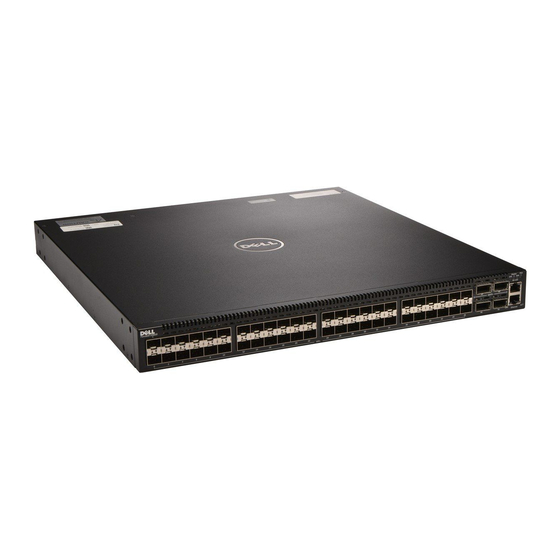Dell Force10 S4810 Konfigurationshandbuch - Seite 7
Blättern Sie online oder laden Sie pdf Konfigurationshandbuch für Schalter Dell Force10 S4810 herunter. Dell Force10 S4810 17 Seiten. Dell force10 s4810 switch
Auch für Dell Force10 S4810: Schnellstart-Handbuch (27 seiten), Handbuch für den Einsatz (36 seiten), Konfigurationshandbuch (17 seiten)

2
Dell recommended switch configuration
These steps show you how to configure two S4810 switches with a Link Aggregation Group (LAG). The
switches are interconnected using two of the 40 GbE Quad Small Form-factor Pluggable (QSFP) uplink
ports, and the LAG is configured for Dynamic Link Aggregation Control Protocol (LACP).
2.1
Hardware configuration
1.
Power on the two switches.
2. Connect a serial cable to the serial port of the first switch.
3. Using Putty or another terminal utility, open a serial connection session to the switch.
4. Open your terminal emulator and configure it to use the serial port (usually COM1 but this may
vary depending on your system). Configure serial communications for 9600,N,8,1 and no flow
control.
5. Connect the (QSFP) LAG cables between the switches, by connecting port 48 on switch 1 to port
48 on switch2 and port 52 on switch 1 to port 52 on switch 2. See this configuration in Figure 1.
2.2
Delete startup configuration
Note: The following commands will delete all configuration settings.
FTOS>enable
FTOS#delete startup-config
Proceed to delete startup-config [confirm yes/no]yes
FTOS#reload
System configuration has been modified. Save? [yes/no]no
Proceed with reload [confirm yes/no]yes
Note: The switch will reboot.
2.3
Configure out of band (OOB) management port
FTOS>enable
After the startup configuration is deleted, the factory default Enable mode password is force10.
FTOS>#config
FTOS(conf)#interface ManagementEthernet 0/0
FTOS(conf-if-ma-0/0)#no shutdown
FTOS(conf-if-ma-0/0)#ip address ipaddress mask
FTOS(conf-if-ma-0/0)#exit
7
SCG1000 | Dell Networking S4810 and Force10 S4810 Configuration Guide for EqualLogic SANs
